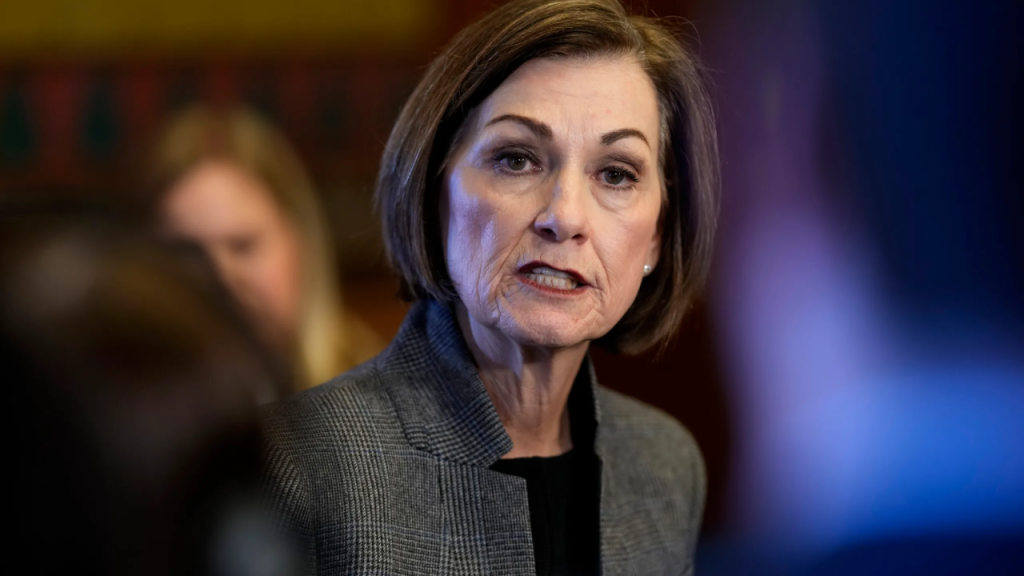The Des Moines Register has pushed back against a lawsuit filed by Iowa Governor Kim Reynolds, reaffirming its demand for access to four internal emails the governor’s office has refused to release. The dispute stems from a public records request originally filed in February 2025 by Register reporter Tyler Jett, focused on communications surrounding Reynolds’ testimony before Congress.
The governor’s legal team has cited “executive privilege” to justify withholding the emails, which were authored by senior staff members and marked “Media Prep Doc.” However, the Register argues that Iowa law does not recognize executive privilege as a valid reason to keep such documents from public scrutiny.
What Prompted the Lawsuit?
On February 11, 2025, Tyler Jett submitted a formal records request asking for documents related to Governor Reynolds’ March testimony before Congress. At that hearing, she was questioned about Lutheran Services in Iowa (LSI), a nonprofit organization falsely linked by conspiracy theorists to child trafficking and money laundering.
Though Reynolds distanced herself from the conspiracy theory during the hearing—stating she did not believe the allegations—her reluctance to directly refute the claims sparked further public interest. In response to the Register’s request, Reynolds’ office released over 800 pages of documents, but withheld four emails they claim are protected.

What’s in the Emails?
The governor’s office has described the withheld emails as internal strategy documents prepared by senior aides, meant to brief Reynolds ahead of her congressional appearance. These communications were neither sent to nor received by the governor herself. They were created to inform her talking points and responses but have not been publicly disclosed.
Reynolds’ legal counsel argues that revealing the content of these emails would discourage staff from offering candid advice in the future. The office claims that such protections are vital for effective executive decision-making.
The Register’s Response
In its response to the governor’s lawsuit, the Des Moines Register maintains that Iowa’s Open Records Law does not grant any such “executive privilege.” Susan Elgin, legal counsel for the newspaper, pointed out that the Iowa Legislature has had numerous opportunities over the past five decades to enshrine executive privilege into law—but has consistently declined to do so.
“This is about transparency,” Elgin stated. “The public has a right to know how decisions are being made and what information is being used to inform those decisions, especially when those decisions involve public testimony before Congress.”
The Register has asked a judge to order the release of the emails, arguing that the governor’s claim of privilege is unsupported by state law and that withholding them sets a dangerous precedent for open government in Iowa.
Wider Implications
The conflict with the Register is part of a broader trend of escalating legal battles over public records in Iowa. The American Civil Liberties Union (ACLU) of Iowa is also currently suing Governor Reynolds over her decision to cancel an event hosted by the Satanic Temple at the Iowa State Capitol. In that case as well, her office cited executive privilege to withhold internal documents.
Critics say Reynolds’ interpretation of executive privilege is a misuse of power and could undermine the state’s longstanding commitment to transparent governance. Advocacy groups warn that if the courts uphold her interpretation, it could set a new norm for withholding critical information from public view.
Legal Context
Under Iowa Code Chapter 22, state and local government records are presumed to be public unless there is a specific exemption. The code does not include executive privilege as one of those exemptions. The governor’s office is now asking the court to expand that interpretation, something open government advocates are warning against.
Allowing this kind of expansion without legislative input is not only bad governance it’s undemocratic,” said one transparency advocate familiar with the case.
The Iowa Public Information Board, which helps resolve public records disputes, has no precedent supporting executive privilege as a shield from disclosure in such cases. Reynolds’ legal team, however, is hoping that the courts will affirm a broader interpretation of confidentiality for the governor’s inner circle.


